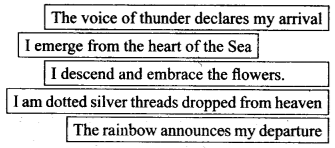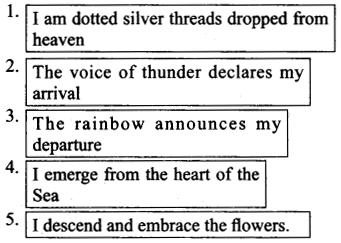Song of the Rain: NCERT 9th Class CBSE English Course Communicative: Literature Reader Interact in English Chapter 12
Question:
(a) Given below are five lines from a poem but they are not in the right order.
Get into groups of four. Read the lines and put them in the right order. Read the version that you develop to the whole class:

(b) What is ‘I’ in these lines?
(c) Imagining yourself as the subject of this poem, write five lines about yourself in less than five minutes.
You may like to
— define yourself
— state what you do
— explain why people like / dislike you
— mention any other characteristic about yourself
Answer: (a)

(b) ‘I’ stands for the rain.
(c) For self-study.
Question: Now listen to a poem about the rain. As you listen number the stanzas given in the boxes.
Answer: For self-attempt.
Question: Read the poem on Page 90.
Answer: For self-attempt.
Question: On the basis of your understanding of the poem, answer the following questions by ticking the correct choice.
(а) The rain calls itself the ‘dotted silver threads’ as ______
- the shimmering drops fall one after the other
- it ties heaven and earth
- it dots the earth with shimmering water
- it decorates the fields
Answer:
- (1.) the shimmering drops fall one after the other
(b) The tone and mood of the rain in the poem reflect its ______
- love for the earth
- desire to take revenge
- merriment as it destroys
- desire to look beautiful
Answer:
- (1.) love for the earth
Question: Answer the following questions:
- Why is the rain divine?
- In this universe, rain performs many functions. What are those?
- “When / cry the hills laugh;
When I humble myself the flowers rejoice;
When I bow, all things are elated.”
Cry, humble and bow indicate different intensity with which the rain falls. Explain the three in context. - How do you think the rain quenches the thirst of the fields and cures clouds’s ailment?
- Think about million little ways in which the rain embraces the trees. Mention a few of them.
- “…All can hear, but only The sensitive can understand” What does the poet want to convey?
- Notice the imagery built around ‘sigh of the sea*, daughter of the field* and dears of heaven ’. Explain the three expressions in context of rain.
How would you express rain as
– an agent of floods?
– a source of water for dams? - “I am like earthly life… ” Why does the poet call rain as earthly life?
- Explain the ending of the song.
Answer:
- The rain appears to be divine because it comes down from heaven. The shimmering drops of rain look like silver threads dropped from heaven. Moreover, it is a life-giving force that elates and smiles all—flowers, fields and valleys.
- In the universe the rain performs many functions. It is sent by Nature to adorn its fields apd valleys and gardens. Hills laugh, flowers rejoice and all are elated when it rains. The rain quenches the thirst of fields and relieves the clouds of their heaviness of vapours. It embraces flowers and trees in a million little ways.
- Certainly, ‘cry’, ‘humble’ and ‘bow’ indicate different intensities with which the rain falls. ‘Cry’ means full blast of the rain that makes ‘hills laugh’ as they receive a lot of rainy water. ‘Humble’ stands for mild intensity of the rain that makes flowers dance and rejoice themselves. ‘Bow’ here means a general rainfall that elates all.
- Naturally, when the rain falls it quenches the thirst of fields. The parched fields only wait for the rain. The rain cures the ailment of clouds. It means the clouds become heavy and want to burst out. But when it rains, they empty themselves into showers and become light again to float in the sky.
- The poet says that the rain embraces the trees in about million little ways. It is just a hyperbolic expression. The rain embraces the trees when the showers fall on them. The showers fall on the trees and go deep into their roots. Even rivers, lakes and drains carry rain water that reaches plants and trees.
- The rain has its own music. Everyone can hear the music and song of the rain. But not all can understand and feel it deeply. Only those with sensitive and delicate hearts can feel and understand the song of the rain.
- he poet has built a very suggestive imagery of rain. He uses the alliteration ‘sigh of the sea’ to express the way sea water evaporates in the form of water vapours. The rain becomes the ‘laughter’ of the field when it helps the growing crops to smile and laugh in joy. As it drops from the sky, it appears as if heaven (sky) is shedding ‘tears’ from above.Rain as an agent of flood:
Tears of sorrow
— Source of water for dams:
Water of life - There is a similarity between earthly life and life cycle of rain. Rain’s arrival and departure is just like birth and death of earthly life. In both the cases, the end is inevitable.
- Kahlil Gibran ends the poem with philosophical overtones. The rain has been termed as a ‘sigh’ rising from the deep love of affection. It is like a laughter that colors the soul. It is like ‘tears’ that fall from the endless heaven of memories.
Question: ‘Ode to Autumn’ is a beautiful poem written by the famous poet John Keats. Listen to an excerpt from the poem and pick phrases which personify autumn. Phrases
Answer:
Phrases
______ ______
______ ______
______ ______
Answer:
personifying autumn
- Thee sitting carelessly on a granary floor
- Thy hair soft-lifted by the winnowing wind
- while thy hook / Spares the next watch
- And sometimes like a gleaner thou dost keep
- Steady thy laden head across a brook
- Thou watchest the last oozings hours by hours.
Question: Rain in the hills and rain in the desert present entirely different scenario. In the hills it revitalises the greenery and freshens the vegetation; it waters the parched land and relieves the thirsty and panting souls in the desert.
This has been a year of scanty rains. Imagine how the rain would be welcomed when it pours in the hills and in the desert after a long dry spell. Choose one of the places and describe
- What are you likely to see?
- What would happen to the rain water?
- What would be the scene before and after the rain?
Answer:
Raining in the Hills
- The rain revitalizes the greenery washing out all dust and dust particles from plants, trees and their leaves. The rain refreshes the vegetation which comes to life again with the arrival of the rain.
- The rain water flows from the tops of the hills into small channels and brooks and soon takes the shape of a river.
- No doubt, greenery and vegetation were there even before the rain. But its appearance was dull and dusty. After the rain, everything looks refreshed, more green and full of life.
Paraphrase & Reference To Context – Song of the Rain
Read the extracts given below and answer the questions that follow:
Question: I am dotted silver threads dropped from heaven
By the gods. Nature then takes me, to adorn
Her fields and valleys.
I am beautiful pearls, plucked from the
Crown of Ishtar by the daughter of Dawn
To embellish the gardens.
(Lines 1—6)
अनुवाद: मैं देवताओं द्वारा स्वर्ग (आकाश) से गिरायी गयी गोल-गोल बूंदों की एक चाँदीनुमा लड़ी हैं। प्रकृति ने अपने खेतों और घाटियों को सजाने के लिये मुझे अपना लिया है। मैं बागों को सजाने के लिये उषा की पुत्री के द्वारा उर्वरता देवी Ishtar के ताज से तोड़ी हुई सुन्दर मोती हूँ।
Paraphrase: The rain calls itself the shimmering drops falling one after another from heaven sent by gods. Nature has adopted it to decorate her fields and valleys. The rain calls herself the ‘pearls’ that were plucked from the crown of Ishtar, the goddess of fertility by the daughter of Dawn to decorate the gardens.

- How does the rain define itself?
- Why has nature adopted the rain?
- ‘I am beautiful pearls’. Name the poetic devices used in this line.
Answer:
- The rain calls itself the shimmering drops falling one after another from heaven sent by gods.
- Nature has adopted it to add beauty to the fields and valleys.
- ‘Personification’ and ‘metaphor’ are the poetic devices used in this line.
Question: When I cry the hills laugh;
When I humble myself the flowers rejoice;
When I bow, all things are elated
The field and the cloud are lovers
And between them I am a messenger of mercy.
I quench the thirst of the one;
I cure the ailment of the other.
(Lines 7—13)
अनुवाद: जब मैं चीखती हूँ तो पहाड़ियाँ हँसने लग जाती हैं। जब मैं स्वयं को विनम्र कर लेती हूँ तो फूल खुशी मनाते हैं। जब मैं झुकती हूँ तो सभी चीजें प्रफुल्लित हो जाती हैं। खेत और बादल प्रेमी हैं और मैं उन दोनों के बीच दया की एक संदेशवाहक हूँ। मैं एक की प्यास बुझाती हूँ और दूसरे के रोग को ठीक करती हूँ। अर्थात् बरसकर बादल के भारीपन को हल्का करती हूँ।
Paraphrase: The rain continues telling that when it cries the hills laugh. When it shows its modesty, the flowers make merry. When it bows down and fall, all things are very happy and excited. The fields and clouds are lovers and the rain is a messenger of mercy between them. The rain quenches the thirst of the field and cures the ailment of the other (cloud). In other words, it relieves the heavily vapour-laden clouds by taking the form of water drops.

- What happens when the rain shows its humility?
- What role does the rain play between fields and clouds?
- Name the poetic device used in the lines.
Answer:
- When the rain shows its humility and modesty, the flowers bloom and rejoice.
- The rain plays the role of a messenger of mercy between the two lovers, the fields and clouds.
- “Personification” is the poetic device used in the lines.
Question: The voice of thunder declares my arrival;
The rainbow announces my departure.
I am like earthly life, which begins at
The feet of the mad elements and ends
Under the upraised wings of death.
I emerge from the heart of the sea and
Soar with the breeze. When I see a field in
Need, I descend and embrace the flowers and
The trees in a million little ways.
(Lines 14—22)
अनुवाद : बिजली की गड़गड़ाहट मेरे आगमन की घोषणा करती है। इन्द्रधनुष मेरे जाने की घोषणा करता है। मैं पृथ्वी के जीवन की तरह हूँ जो प्रकृति के विभिन्न अवयवों से जन्म लेता है और अंत में मृत्यु को प्राप्त होता है। मैं समुद्र के हृदय से ऊपर उठती हूँ और समीर के साथ ऊपर उड़ जाती हैं। जब किसी खेत को मेरी जरूरत होती है, तो मैं नीचे उतरती हूँ और लाखों छोटे-छोटे रूपों में फूलों और वृक्षों को अपने आगोश में ले लेती हूँ।
Paraphrase: The thundering sound of lightning announces the arrival of the rain. The rainbow announces its departure. The life of rain resembles the earthly life. The earthly life is born out of different elements of nature and meets its death in the end. The rain rises up from the heart of the sea nd it soars high with the breeze. When it sees a field in need, it comes down (rains) and embraces flowers and trees in a million little ways.

- How are the arrival and departure of the rain announced?
- Describe the poetic device used in the third line.
- How and when does the rain oblige fields, flowers and trees?
Answer:
- The thundering sound of lightning announces the arrival and the rainbow announces the departure of the rain.
- The poetic device used in the third line is simile.
- When the rain sees fields, flowers and trees in need, it obliges them in a million little ways.
Question: I touch gently at the windows with my
Soft fingers, and my announcement is a
Welcome song. All can hear, but only
The sensitive can understand.
I am the sigh of the sea;
The laughter of the field;
The tears of heaven.
(Lines 23—29)
अनुवाद: मैं अपनी नरम ऊंगलियों से खिड़की को हल्के से छूती हूँ और मेरा आगमन एक स्वागत गीत की तरह है। इसे सभी सुन सकते हैं लेकिन केवल कोमल हृदयी ही इसे समझ सकते हैं। मैं समुद्र की आह हूँ, खेत की हँसी हूँ। और आकाश की आँसू हूँ।
Paraphrase: The rain touches the windows with its soft fingers. Her arrival is like a welcome song. All hear it but only sensitive souls can understand it. The rain is the sigh of the sea, the laughter of the field and tears of the sky.

- How does the rain touch the windows?
- Who can hear’ and ‘understand’ the rain?
- What is the rain for the sea, the fields and the sky?
Answer:
- The rain touches the windows with its soft fingers.
- All can hear but only sensitive souls can understand the rain.
- It is the sight of the sea, the laughter of the field and tears of the sky.
Question: So with love –
Sighs from the deep sea of affection; Laughter from the colorful
field of the spirit; Tears from the endless heaven of memories.
(Lines 30—32)
अनुवाद: इसीलिए प्यार से मैं स्नेह (प्यार) के गहरे समुद्र से आहें भरती हूँ, और आत्मा के रंगीन खेतों से हँसती हूँ। और यादों के अनंत आकाश से आँसू बहाती हूँ।
Paraphrase: So, with love the rain sighs from the deep sea of love and affection. It rises like a laughter from the colourful fields of the soul. It falls down like tears from the endless heaven of memories.

- What does the rain sigh from the deep sea of affection?
- How does it fall down from the endless heaven?
- What is the rain for the colorful fields of the soul?
Answer:
- From the deep sea of love and affection the rain heaves a deep sigh of lvoe.
- The rain falls down like tears from the endless heaven of memories.
- It is like a laughter for the colorful fields of the soul.
ABOUT THE POEM – Song of the Rain
‘Song of the Rain’ describes the origin and end of rain — a natural phenomenon — in the voice of rain itself. The rain tells us of the various functions it performs. It falls down from the sky on the earth. It decorates fields, valley and gardens. When it falls down on flowers in the form of gentle showers, flowers become happy. It quenches the thirst of fields.
The voice of thunder announces the arrival of the rain. The appearance of a rainbow in the sky announces the departaure of the rain.
The rain tells it origin. The water from the sea mixes with the air and forms a cloud in the sky. When the cloud bursts, it becomes rain. The water from the cloud falls on the field. The rain is merciful. The rain declares that it is the sigh of the deep sea, laughter of the colourful fields and tears of the sky.
REFERENCE TO CONTEXT QUESTIONS (SOLVED)
Read the extracts given below and answer the questions that follow :
Question: I am dotted silver threads dropped from heaven
By the gods. Nature then takes me to adorn
Her fields and valleys. (CBSE 2014)
- Name the poem and the poet of the above extract.
- Who is T? Why is T being compared to silver threads ?
- Explain the line ‘Nature…. valleys’.
Answer:
- The poem is ‘Song of the Rain’. The poet is Kahlil Gibran.
- ‘I’ is the rain. T, that is the rain, falls in strings of sparkling drops, like silver threads.
- The line means that Nature uses rain to decorate fields and valleys. Fields and valleys look fresh and beautiful with rain drops.
Question: I touch gently at the windows with my Soft fingers, and my announcement is a Welcome song. All can hear, but only the sensitive can understand. (CBSE 2014)
- How is the arrival of rain announced ?
- Why is it welcomed ?
- What is the difference between hearing and understanding ?
Answer:
- The arrival of the rain is announced by a welcome song.
- It is welcomed because it is needed by all – men, animals, plants.
- Hearing means hearing casually, whereas understanding implies hearing something with understanding its meaning as well.
Question: ‘The voice of thunder declares my arrival,
The rainbow announces my departure.
I am like earthly life which begins at The feet of the mad elements and ends Under the wings of death’.
- Whose arrival is declared by ‘the voice of thunder’ ?
- ‘I am like earthly life’. Explain.
- What do you mean by ‘wings of death’ ?
Answer:
- The rain’s arrival is declared by ‘the voice of thunder’.
- The rain’s life is similar to the worldly life. It takes birth and then dies.
- “Wings of death’ means various causes or forces of death.
Question: I am beautiful pearls, plucked from the Crown of Ishtar by the daughter of dawn To embellish the gardens.
- Who is compared to “beautiful pearls’ ?
- What is the function of rain ?
- What do you understand by ‘Ishtar’ ?
Answer:
- Rain drops are compared to beautiful pearls.
- Rain decorates gardens. Rain drops make them look more beautiful.
- ‘Ishtar’ is the Goddess of fertility, love, war and sex.
Question: ‘I am the sigh of the sea, the laughter of the field The tears of heaven’.
- Who is the speaker in these lines ?
- How is the speaker the ‘laughter of the field’?
- ‘I am the sigh of the sea’. Explain.
Answer:
- Rain is the speaker in these lines.
- When rain falls and quenches the thirst of the field, the field becomes happy and seems to laugh.
- It refers to the birth of the rain when water evaporates and rises high in the sky.
Question: The field and the cloud are lovers
And between them I am a messenger of mercy.
I quench the thirst of the one I cure the ailment of the other.
- How is the rain ‘a messenger of mercy’?
- What does the rain do?
- What do you mean by ‘ailment’?
Answer:
- Rain takes mercy on the field and the cloud (the separated lovers) and unite them by mediating between them.
- Rain satisfy both the field and the cloud.
- ‘disease’.
SHORT ANSWER QUESTIONS (SOLVED)
Answer each of the following questions in 30-40 words.
Song of the Rain – Question: Who plucks the pearls from the Crown of Ishtar? Why does she do so? (CBSE 2014)
Answer: It is the daughter of dawn that plucks the pearls (rain drops) from the Crown of Ishtar, the goddess of fertility. These pearls are picked up to give new life to seeds sown in the earth.
Question: Who drops the silver threads in the poem ‘Song of the Rain’ and who takes them? (CBSE 2014)
Or
List any two things that happen when the ‘dropped silver threads from heaven’ fall on the earth. (CBSE 2014)
Answer: God drops the silver threads (series of sparkling rain drops looking like silver threads) down on the earth. When the silver threads, that is, rain drops, fall, fields, gardens and valleys become happy and look beautifully adorned.
Question: How do the hills, flowers and fields respond to the arrival of the rain? (CBSE 2014)
Answer: When the rain comes, hills, flowers and fields become happy. They get decorated and look fresh and beautiful. The rain seems to give them new life.
Question: How does the rain embrace the flowers and trees in the poem ‘Song of the Rain’? (CBSE 2014)
Answer: The rain embraces flowers and trees with tenderness and affection. Flowers begin to bloom. Everything in nature is rejuvenated and looks fresh and colorful.
Question: Why are all the things elated when the rain falls? (CBSE 2014)
Answer: All the things are elated when the rain falls. It is so because the rain brings life and rejuvenate everything. The thirst of fields is quenched. Everything in nature looks fresh, green and beautiful.
Question: How do you think the rain quenches the thirst of the fields and cures the ailment of the clouds?
Answer: Fields and clouds are like lovers. They want to get united. When the rain falls, the thirst of the fields is quenched and the clouds get cured of its love sickness.
Question: How is the rain a ‘messenger of mercy’? (CBSE 2014)
Answer: The rain takes pity on the fields and the cloud. When it falls, it rejuvenates fields, plants and trees. It also cures the ‘love-sickness’ of the cloud.
Question: Explain the line ‘All can hear hut only the sensitive can understand’ from the poem ‘Song of the Rain’. (CBSE 2014)
Answer: The welcome song of the rain is heard by all. But only those who are sensitive and can feel can understand its meaning and enjoy it.
Question: How has rain been personified in the poem ‘Song of the Rain’?
Answer: The rain has been personified in many ways. It is seen as a manifestation of new life, a messenger of mercy, etc. It is also viewed as the sigh of the sea, the laughter of the field and the tears of heaven.
Question: ‘I am sigh of the sea, the laughter of the field and tears of heaven’. Explain.
Answer: The poet sees the whole phenomenon of the origin, birth and death of rain poetically. When water evaporates and rises up in the sky, it seems to sigh. In this sense, the rain is the sigh of the sea. When rain drops fall from the sky, they look like tears of heaven. The fields seem to laugh when the rain falls. In this sense, the rain is the laughter of the field.
Question: What are the different intensities with which the rain falls?
Answer: When the rain falls heavily the hills cry out in joy. A loud sound is produced. When the rain falls lightly it makes flowers rejoice. When it drizzles, everyone enjoys it and feels happy.
Question: Notice the imagery built around ‘sigh of the sea’, ‘laughter of the field’ and ‘tears of heaven’. Explain the three expressions in the context of rain.
Answer: ‘Sigh of the sea’ is a brilliant image. It creates an image of the soft, gentle and tender movement of the sea when the rain falls in it.
‘Laughter of the fields’ is a beautiful image. It creates an image of the happiness of the field when the rain falls on it and quenches its thirst.
‘Tears of heaven’ is a subtle image. It creates an image of the drops of the rain falling from the sky on the earth when the cloud bursts. When the cloud bursts, it dies. So the drops of rain are referred to as the tears of heaven.
Question: “I am like earthly life……………. ”
Why does the poet call rain as earthly life ?
Answer: The poet calls rain as earthly life because the fate of rain is like that of man on the earth. When the child is born, it grows up into the young man and then an old man, and finally dies in the end. Similarly, rain is born in the form of a cloud in the sky. When the cloud bursts, it dies.
Question: Explain the ending of the poem.
Answer – Song of the Rain: At the end of the poem, the rain declares affectionately that it is the sigh of the deep sea, the laughter of the colorful fields and the tears (drops of water) of the sky. When the rain falls in the sea, it (the sea) sighs. When the rain falls on the fields and quenches their thirst, the fields rejoice, become colorful and feel happy. When the cloud bursts, it becomes rain. The cloud dies and the drops of rain (tears of heaven) fall on the earth.
Question: “When I cry the hills laugh,
When I humble myself the flowers rejoice,
When I bow, all things are elated.”
Cry, humble and bow indicate different intensity with which the rain falls.
Explain the three in context.
Song of the Rain – Answer:
Cry: When the rain falls heavily on the hills, they produce the sound of laughter.
Humble: When the rain falls gently and softly, the flowers bloom and rejoice.
Bow: When the rain changes itself into a soft drizzle, all things are elated.
 Class Notes NCERT Solutions for CBSE Students
Class Notes NCERT Solutions for CBSE Students




